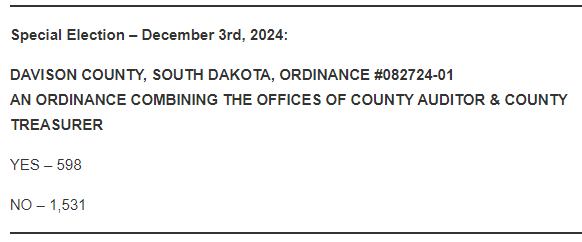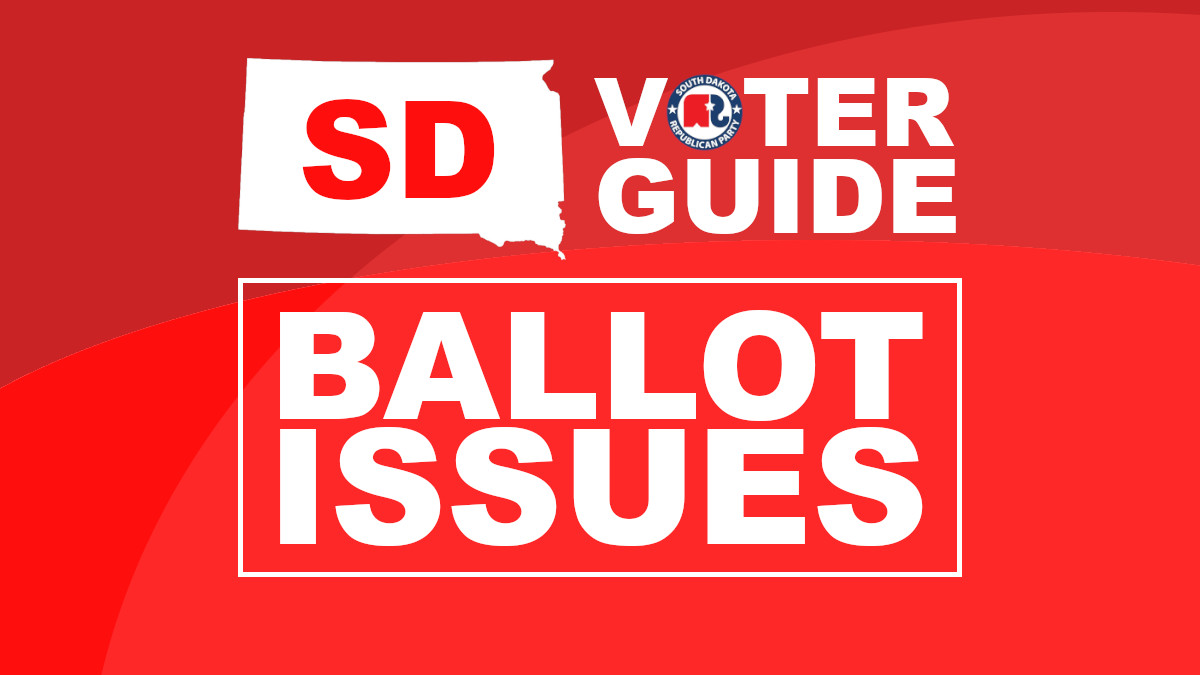Following huge wins in electing better Representation around the state in many races…
Huge wins in defeated ballot measures…
We saw huge wins last night in South Dakota with a new era of leadership…
The South Dakota House of Representatives has several key leadership roles, each with distinct responsibilities that help guide the legislative process. Here’s a breakdown of the main roles and their functions:
1. Speaker of the House
- Primary Responsibilities: The Speaker is the highest-ranking officer in the House, elected by the members. They preside over House sessions, maintain order, and decide points of order (subject to appeal).
- Duties: Assigns bills to committees, determines the legislative calendar, and manages floor debates. The Speaker also has influence over legislative priorities and plays a role in appointing members to committees.
2. Speaker Pro Tempore
- Primary Responsibilities: The Speaker Pro Tempore assists the Speaker and stands in for them if they are absent or unable to fulfill their duties.
- Duties: Often presides over sessions, especially when the Speaker is unavailable, and may help with administrative tasks as needed. This role is usually supportive, ensuring continuity in the Speaker’s functions.
3. Majority Leader
- Primary Responsibilities: The Majority Leader represents the party with the most seats and leads the legislative agenda for the majority party.
- Duties: Coordinates party strategy, works to build consensus among members, and schedules the consideration of bills favored by the majority. They are the primary spokesperson for their party on the House floor.
4. Minority Leader
- Primary Responsibilities: The Minority Leader leads the party with fewer seats, representing their interests and views.
- Duties: Works to promote the legislative goals of the minority party, organizes opposition to majority party initiatives when necessary, and negotiates with the Majority Leader on key issues. The Minority Leader also coordinates with minority party members on strategy.
5. Whips (Majority and Minority)
- Primary Responsibilities: Each party has a whip (or sometimes multiple whips) who assists party leaders in managing and tracking votes.
- Duties: Responsible for “whipping” votes, meaning they communicate with members to understand how they plan to vote, encourage alignment with party positions, and ensure enough votes are secured for key measures. Whips are essential in gauging party support and maintaining discipline.
6. Committee Chairs
- Primary Responsibilities: Each committee in the House has a chairperson appointed by the Speaker or majority party leaders. Chairs lead individual committees and guide the process of reviewing bills.
- Duties: Set agendas for committee meetings, preside over discussions, and facilitate hearings. Chairs have significant influence over which bills advance out of committee and are ultimately considered on the House floor.
These roles are essential for organizing and maintaining order within the legislative body, ensuring that legislation is debated, refined, and voted on effectively.
And likewise in the Senate:
The South Dakota Senate has leadership roles similar to those in the House, with each position carrying specific duties to guide and manage the legislative process. Here’s an overview of the key leadership roles in the South Dakota Senate and their functions:
1. President of the Senate (Lieutenant Governor)
- Primary Responsibilities: The Lieutenant Governor serves as the President of the Senate but is not a member of the Senate. They preside over Senate sessions and have a mostly ceremonial role.
- Duties: The President oversees Senate proceedings, maintains order, and may cast a tie-breaking vote. However, they do not participate in Senate debates or vote on regular legislation.
2. President Pro Tempore
- Primary Responsibilities: Elected by Senate members, the President Pro Tempore is the highest-ranking member of the Senate and acts as the presiding officer when the Lieutenant Governor is absent.
- Duties: Manages day-to-day legislative proceedings, assigns bills to committees, appoints committee members, and plays a significant role in setting the legislative agenda. The President Pro Tempore is a crucial leader who helps coordinate Senate activities and often represents the Senate in official capacities.
3. Majority Leader
- Primary Responsibilities: The Majority Leader is elected by the majority party and leads the legislative agenda for their party within the Senate.
- Duties: Sets legislative priorities, manages the scheduling of bills favored by the majority, and works to build consensus among majority members. They are the spokesperson for the majority party and often negotiate with the Minority Leader on legislative issues.
4. Minority Leader
- Primary Responsibilities: The Minority Leader leads the party with fewer seats in the Senate, representing their views and strategies.
- Duties: Works to coordinate opposition to the majority’s agenda when necessary, promotes minority party legislative goals, and negotiates with the Majority Leader on key issues. The Minority Leader is the voice of the minority party in the Senate.
5. Whips (Majority and Minority)
- Primary Responsibilities: Each party has a whip (or sometimes multiple whips) who assists party leaders in managing votes and maintaining party unity.
- Duties: Responsible for tracking member votes, encouraging alignment with party positions, and ensuring the necessary votes are secured for key measures. Whips play an essential role in party discipline and gauge support for upcoming votes.
6. Committee Chairs
- Primary Responsibilities: Each committee in the Senate has a chairperson appointed by the President Pro Tempore or party leaders in the majority.
- Duties: Lead committee meetings, set agendas, and oversee the process of reviewing bills. Committee Chairs influence which bills advance for full Senate consideration and are integral in refining legislation through hearings and debates.
Each of these roles contributes to the smooth operation of the Senate, ensuring that legislation is thoughtfully reviewed, debated, and advanced according to established rules and procedures.
God speed to each of you!





Lets hope Mortenson, Rehfeldt and Venhuizen are not given plum chairmanship and committee assignments. They have worked against conservatives running for office with Dusty Johnson, Dennis Daugaard and Lee Schoenbeck for years. Venhuizen has worked against conservatives since he worked in Daugaard’s administration.
Look at the money they shelled out against conservatives this primary season.
Conservatives for committee chairs!
Americans for Prisperity really screwed up when they supported Amber Hulse. She held out from voting for Karr and also supported Crabtree all 3 rounds.
For someone who said she was a turning point, Trump Republican She really fell into the establishment fast.
She’s fake and not to be trusted.